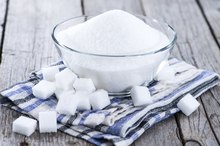What does fact checked mean?
At Healthfully, we strive to deliver objective content that is accurate and up-to-date. Our team periodically reviews articles in order to ensure content quality. The sources cited below consist of evidence from peer-reviewed journals, prominent medical organizations, academic associations, and government data.
- MedlinePlus: Carbohydrates
- JAMA Internal Medicine: Added Sugar Intake and Cardiovascular Diseases Mortality Among U.S. Adults
- JAMA Internal Medicine: Added Sugar Intake and Cardiovascular Diseases Mortality Among U.S. Adults
The information contained on this site is for informational purposes only, and should not be used as a substitute for the advice of a professional health care provider. Please check with the appropriate physician regarding health questions and concerns. Although we strive to deliver accurate and up-to-date information, no guarantee to that effect is made.
What Are the Pros & Cons of Sugar?
Sugar provides a quick source of energy, but that's about the only thing it has going for it. In all its forms, sugar offers little to no nutrients and extra calories that lead to weight gain and its associated health problems. Sugar also causes heart disease, tooth decay, weakened immunity and various other conditions. While a little is OK, you're better off without it.
Quick Source of Energy for Athletes
Sugar is a type of carbohydrate, the macronutrient your body uses as its main source of energy. Table sugar, corn syrup, honey and other sweeteners are all simple sugars. Your body breaks them down and metabolizes them quickly. They are almost immediately available for use as energy, unlike complex carbohydrates, which your body breaks down more slowly 4. Many athletes, especially endurance athletes, rely on simple sugars to keep them going through long, strenuous workouts or competitions because they're easy to digest.
- Sugar is a type of carbohydrate, the macronutrient your body uses as its main source of energy.
- Many athletes, especially endurance athletes, rely on simple sugars to keep them going through long, strenuous workouts or competitions because they're easy to digest.
Energy Crashes
Advantages & Disadvantages of Carbohydrates
Learn More
Simple sugars aren't a good source of energy for the average person. Because your body breaks them down so quickly, they promote a spike in blood sugar -- great for the marathon runner but not so great for you when you're sitting at your desk. In response to the surge of sugar into your bloodstream, your pancreas releases extra insulin to help usher the blood sugar into cells. This results in a precipitous drop in blood sugar and energy, which can leave you fatigued and unable to concentrate. It can also increase your hunger, especially your cravings for more simple carbs.
- Simple sugars aren't a good source of energy for the average person.
- This results in a precipitous drop in blood sugar and energy, which can leave you fatigued and unable to concentrate.
Source of Empty Calories
Most types of sugar, from table sugar to honey, offer few, if any, nutrients, such as vitamins, minerals, protein or fiber, but they still offer 4 calories per gram, just like other carbohydrates 4. That's why they're referred to as "empty calories." Most empty-calorie foods are calorie-dense, so eating just a small handful of jelly beans may provide you with the same amount of calories as a large salad, but without all the nutrients or feeling of fullness. You may continue to eat the jelly beans -- or the cake, or drink the soda -- without ever feeling full, all the while taking in a lot of calories. When your body doesn't use those calories for energy, they turn to fat.
- Most types of sugar, from table sugar to honey, offer few, if any, nutrients, such as vitamins, minerals, protein or fiber, but they still offer 4 calories per gram, just like other carbohydrates 4.
Promotes Leptin Resistance
Manuka Honey Side Effects
Learn More
Leptin is a hormone your body produces that signals satiety. It's what allows you to feel full and put down your fork instead of continuing to eat. Eating a lot of fructose, found in sodas, candy and other processed foods, may make you leptin resistant, according to a study published in the American Journal of Physiology in November 2008. As a result, you may eat too much without feeling full, which can lead to obesity and its associated diseases.
- Leptin is a hormone your body produces that signals satiety.
- Eating a lot of fructose, found in sodas, candy and other processed foods, may make you leptin resistant, according to a study published in the American Journal of Physiology in November 2008.
Chronic Diseases
Sugar is associated with the development of several chronic diseases, including type 2 diabetes and heart disease. Although eating too much sugar isn't a direct cause of type 2 diabetes, being overweight is a major risk factor. If you have prediabetes, regularly eating too much sugar can trigger the full-blown condition, according to ConsumerReports.org 7. In a study published in JAMA Internal Medicine in April 2014, researchers recorded a significant relationship between added sugar intake and risk of death from cardiovascular disease 8. During the 15-year study, participants who consumed more than a quarter of their calories from sugar had more than double the risk of death from cardiovascular disease compared to those who consumed less than 10 percent of calories from sugar.
- Sugar is associated with the development of several chronic diseases, including type 2 diabetes and heart disease.
- If you have prediabetes, regularly eating too much sugar can trigger the full-blown condition, according to ConsumerReports.org 7.
Other Negative Effects
Sugar promotes plaque buildup and the breakdown of tooth enamel in combination with bacteria in your mouth, which can lead to cavities and tooth decay. Excess sugar consumption also weakens immune function. Consuming the equivalent of 8 tablespoons of sugar -- the amount in 30 ounces of soda -- can reduce white blood cells' abilities to kill germs by almost half, reports the Ask Dr. Sears website. Sugar -- especially sugary sodas -- may even accelerate the aging of your cells, leading to disease development, according to research published in the American Journal of Public Health in December 2014.
- Sugar promotes plaque buildup and the breakdown of tooth enamel in combination with bacteria in your mouth, which can lead to cavities and tooth decay.
- Sugar -- especially sugary sodas -- may even accelerate the aging of your cells, leading to disease development, according to research published in the American Journal of Public Health in December 2014.
Related Articles
References
- The New York Times Magazine: Is Sugar Toxic?
- The Telegraph: Sweet Poison: Why Sugar Is Ruining Our Health
- Dr. Mark Hyman: Eggs Don’t Cause Heart Attacks — Sugar Does
- MedlinePlus: Carbohydrates
- Dr. Ronald Hoffman: Hypoglycemia
- American Journal of Physiology: Fructose-Induced Leptin Resistance Exacerbates Weight Gain in Response to Subsequent High-Fat Feeding
- ConsumerReports.org: 10 Diabetes Myths
- JAMA Internal Medicine: Added Sugar Intake and Cardiovascular Diseases Mortality Among U.S. Adults
- Rippe JM, Angelopoulos TJ. Sucrose, High-Fructose Corn Syrup, and Fructose, Their Metabolism and Potential Health Effects: What Do We Really Know? Adv Nutr. 2013;4(2):236-245. doi:10.3945/an.112.002824
- U.S. Department of Agriculture. Cut Down on Added Sugars. 2016.
- Rampersaud GC, Kim H, Gao Z, House LA. Knowledge, perceptions, and behaviors of adults concerning nonalcoholic beverages suggest some lack of comprehension related to sugars. Nutr Res. 2014;34(2):134-142. doi:10.1016/j.nutres.2013.11.004
- Tandel KR. Sugar substitutes: Health controversy over perceived benefits. J Pharmacol Pharmacother. 2011;2(4):236-243. doi:10.4103/0976-500X.85936
- Bray GA. Energy and Fructose From Beverages Sweetened With Sugar or High-Fructose Corn Syrup Pose a Health Risk for Some People. Adv Nutr. 2013;4(2):220-225. doi:10.3945/an.112.002816
- American Dental Association. American Dental Association Encouraged by Soda Makers’ Pledge to Promote Smaller Sizes, Less Sugar. 2014.
- U.S. Department of Health and Human Services and U.S. Department of Agriculture. 2015–2020 Dietary Guidelines for Americans. 8th Edition. 2015.
Writer Bio
Jody Braverman is a professional writer and editor based in Atlanta. She studied creative writing at the American University of Paris and received a Bachelor of Arts in English from the University of Maryland. She also received personal trainer certification from NASM and her 200-hour yoga teacher certification from YogaWorks.









